Gallery redefines Alaska's art and architecture
By Kerynn Fisher, University
of Alaska Museum of the North
May 2006
![]()
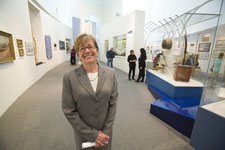
Museum
Director Aldona Jonaitis beams as she welcomes visitors to the new Rose
Berry Alaska Art Gallery. UAF Photo by Todd Paris.
![]()

Mindy Cameron of Lehrman Cameron Studio presented design concepts to museum
staff during an art gallery planning meeting. Photo by Kerynn Fisher.
![]()

The
expanded museum’s architecture evokes images of glaciers, alpine ridges
and a diving whale’s tail. Photo by Patricia Fisher.
![]()

Dignitaries, donors and university and museum representatives gathered at 8
a.m. May 1 to cut the ribbon officially opening the Rose Berry Alaska Art
Gallery. UAF photo by Todd Paris.
![]()
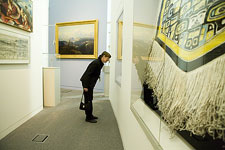
A
visitor leans in for a good view of a case next to a Tlingit Chilkat robe. UAF photo
by Todd Paris.
![]()
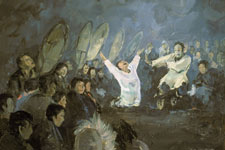
The
new gallery features many different media, including paintings such
as Eskimo Dance #5 by Theodore Lambert.
![]()
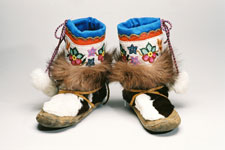
Beautifully decorated Alaska Native tools,
clothing and other objects made for utilitarian purposes, such as Athabascan
boots, are included in the new gallery. Photo by Brian Allen.
Think of Alaska architecture, and igloos, a miner’s cache or rustic cabins probably come to mind. Say "art gallery" and you probably think of paintings and sculptures. At the University of Alaska Museum of the North, new exhibits are helping redefine those stereotypes.

Exhibit designers created artist’s renderings to help museum staff visualize the
exhibit installation. Rendering by: Lehrman Cameron Studio.
Architecture as Art
"When we started planning for the museum expansion, we knew an art gallery would be a key component. One of the central themes we wanted to explore was how Alaska’s art helps express a sense of place," says museum Director Aldona Jonaitis. "It was only natural to have a building that also expressed a sense of Alaska."
Museum staff worked with a team to design the expansion. Joan Soranno, with Minneapolis-based Hammel Green & Abrahamson, served as the design architect, with Alaska-based GDM providing the subarctic expertise to make the building’s dynamic design work in Fairbanks’ extreme climate.
Overlooking the Tanana Valley and the Alaska Range, the white building evokes images of glaciers, alpine ridges and a diving whale’s tail. It is generating comments far beyond Fairbanks. A March story in American Way magazine states "A work in progress, this striking building, designed by architect Joan Soranno, is the most interesting piece of contemporary architecture in all of Alaska."
"The building captures visitors’ attention the moment they arrive in Fairbanks," says Jonaitis. "The view changes dramatically as they approach the building, so the museum is constantly revealing itself to the visitor."
Inside the Museum
Walking into the museum is like walking into a glacial crevasse, with the sheer white sides of the building converging on either side of the glass-walled entrance. Inside, floor-to-ceiling windows bring light--and the views of the Alaska landscape--into the lobby. It’s a subtle reminder to the visitor that all the exhibits are inspired by and integrally related to life in Alaska.
![]()
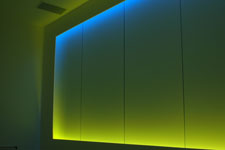
The
Place Where You Go to Listen draws on the cycles of daylight and
darkness, the phases of the moon, seismic activity and the aurora. Photo
by Roger Topp.
New galleries, combined with the exhibits in the museum’s original Gallery of Alaska, round out the visitor experience. The museum’s main level features a new special exhibits gallery and the Alaska Classics Gallery, which offers a floor-to-ceiling display of historic paintings from the museum’s collection. A resource desk and computer kiosk links to Alaska’s Digital Archives to give visitors more information on the artists, their work and Alaska history and Native cultures.
Upstairs, a new installation created by Fairbanks composer John Luther Adams, The Place Where You Go to Listen, draws on the cycles of day and night, the phases of the moon, seismic activity and the aurora to create an ever-changing sound and light environment. Driven by real-time data streams developed with the help of researchers from UAF’s Geophysical Institute, the sound and light experience has no beginning, middle or end and changes constantly to reflect current conditions.
"This is a place for hearing the unheard vibrations of the world around us. I think anyone with an innate sense of curiosity about the world we live in will get something out of the experience," says Adams, who encourages people to visit The Place often to see how it changes from day to night and from season to season.
Jonaitis first approached Adams in 1998 with the idea of creating a sound environment in the expanded museum, even before an architect had been selected for the project. Jonaitis envisioned a quiet, contemplative space for visitors that would be an expression of Alaska in audible form, much like the architecture and exhibits in the new wing would be visual expressions of Alaska’s artistic influence.
"I wanted something that would be unique to Alaska, to this location overlooking the Tanana Valley and the Alaska Range. The Place is very much a reflection of the dynamic natural forces at work in Alaska," said Jonaitis. "It’s also a striking contrast to the more traditional oil paintings we have on display in the Alaska Classics gallery. Together, they help illustrate the very broad spectrum of artistic expression in Alaska."
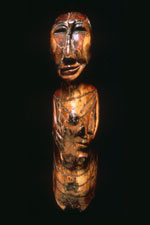
The Okvik Madonna, a 2,000-year-old ivory carving, is featured in the "Highlights" section of the art gallery. Photo by Barry McWayne
2,000 Years of Alaska’s Art
The centerpiece of the new wing, the Rose Berry Alaska Art Gallery, opened
to visitors May 1. Inside, curved and sloping walls mirror the dynamic
architecture of the building’s exterior. Like the Alaska landscape,
the gallery’s interior architecture, designed by Mindy Cameron of
Seattle’s Lehrman Cameron Studio, features few 90-degree angles.
Various shades of blue on the interior walls and glass exhibit cases that resemble floating chunks of ice bring the glacier theme into the gallery. High ceilings, soaring from 16 feet near the entrance to 40 feet at the far end of the gallery, help convey the vastness of Alaska.
In this new gallery, Alaska’s art takes center stage. A freestanding exhibit case of Alaska Native clothing and tools greets visitors when they walk through the entryway. To the right, exhibit cases lining the walls showcase the museum’s oldest art pieces--ancient ivory carvings and other artifacts from the museum’s archaeological collections.
"In some places, these pieces might be displayed in a natural history gallery or as craft," says Jonaitis. "Since we want to present the full spectrum of Alaska’s art, it’s only fitting that the first thing visitors see in this gallery is the art of Alaska’s first peoples."
Proceeding into the gallery, visitors can see paintings, photographs and other works by visitors to Alaska, including Ansel Adams and Rockwell Kent, along with works by Alaska artists, both Native and non-Native, traditional and contemporary. Another section focuses on the art of Interior Alaska, using the art to illustrate the themes of the boreal forest, the people and the cold.
In the center of the gallery, a ramp leads to three of the museum’s most treasured pieces--Mt. McKinley, an oil landscape by Sydney Laurence; the Okvik Madonna, a 2,000-year-old ivory carving; and a parka of wolverine, wolf and ground squirrel hides which was made in the 1960s by Helen Seveck, an Inupiat woman.
"They represent different time periods, different media and, in terms of gender and ethnicity, the diversity of artists in this gallery," says Jonaitis. "There’s no question that they all exhibit great vision, artistry and skill, yet few museums would present them side-by-side. Here, we celebrate them as works of equal value."
Reactions from visitors to the new gallery during the May 1 opening celebrations were positive. Visitors from Virginia said the experience enriched their visit to Alaska and Fairbanks. A Fairbanksan commented on how nice it was to see such a variety of artistic expression, noting that the writings from local people were particularly revealing.
Roger C. Burggraf of Fairbanks said he especially enjoyed the paintings. “I knew many of the artists and can appreciate their work. Thanks to all who made the art museum possible.”
UAF honorary degree recipient and former regent Hugh Fate summed up the feelings of many. “All the hard work and all the dreams come to fruition. It’s exquisite.”
For more information, please contact:
-
Kerynn Fisher, communications coordinator, University of Alaska Museum of the North, (907) 474-6941, k.fisher@uaf.edu
-
Aldona Jonaitis, director, University of Alaska Museum of the North, (907) 474-6939, ffaj@uaf.edu
Other useful links:
- Museum Expansion Project
- Museum Exhibit galleries
Recent News Stories:
- Boston Globe
- Minneapolis Star-Tribune
- New York Times
- Anchorage Daily News


